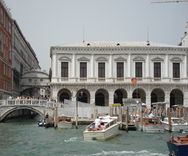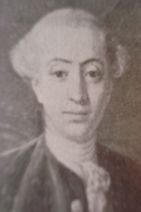
|

GIACOMO CASANOVA
Giacomo Casanova was born in Venice on the 2nd of April
1725 from a family of actors (Gaetano was the father and Maria Giovanna called
Zanetta the mother). As a child he lived in the area of San Samuele,
in the Malipiero Palace located in Calle della Commedia, but now called
Calle Malipiero. He was one of the most controversial Venetian
celebrity of the eighteenth century, a period of decline for the city. He was philanderer
and adventurer, writer and librarian, magician and historian, diplomat and spy,
even though he is remembered mainly for being the first
Italian latin-lover. His figure is often approached to that
of Don Juan, but, while Giacomo Casanova appeared to be "in love" with the
women who seduced, the second one only boasted of his achievements and did not feel any
sense for women. The young Giacomo Casanova was secretary of Cardinal P. Acquaviva
in Rome, then joined the army and then became a violin player for the Teatro
di S. Samuel, located a few steps from Malipiero Palace. His life had a
positive sense because of a fact happened
outside a dance party, yet. Indeed, following a poisoning, Daniele Bragadin, Procuratore
of S. Mark and senator, was saved by rescue of Giacomo Casanova. From that moment
he was adopted by Bragadin that kept him under his protection, often helping him
with the problems he had with justice (he was repeatedly investigated by the
Quarantia Criminal and the notorious Council of X), and also economically. In
the city, the favorite places of Giacomo Casanova were the Florian Cafe and the
Casino del Ridotto, in this place he could gamble and entertain the ladies seduced
by him.

Giacomo Casanova started in 1750 a tour around Europe where he stopped for some periods
in Paris, Prague, Vienna and Germany. Then he came back to Venice
where he was arrested on the 26th of July 1755 and locked in the prisons of
Piombi, on charges of magic and masonry. The period of imprisonment
was short: at his second attempt, the night of 31 October 1756, Giacomo Casanova managed to
escape, helped by another prisoner. He wrote about his escape a detailed
book Histoire de ma fuite des Prisons de la Republique de Venise qu'on appelle les Plombs
(written in Bohemia in 1788). Giacomo Casanova after the escape was forced to leave
Venice by gondola and head towards the mainland and then travel to the Netherlands and
Belgium, then stay in Paris from 1757. Here he met Cagliostro (which became his teacher in
the practice of esoterism), and introduced the game of lotto, so much in vogue at the
Serenissima but unknown in France. Giacomo Casanova with the help of Daniele Bragadin
(who died in 1767) could return to the Serenissima continuing in the years following
his dissolute life, but was exiled from all the lands of the Republic of Venice for
his bad behavior in 1782, this time for ever. The adventurer, after having wandered
for Europe, went to the Castle of Dux in Bohemia where he was host and librarian
of Count Waldstein. In this place he will remain until the end of his days dedicated
to the translation of Iliad and writing the book Icosameron. Between 1791 and 1798
he wrote the story of his adventurous life in the book Memoires,
describing his achievements in love, (122 women are quoted in his stories),
his travels and his way of life. Giacomo Casanova died in exile in the Castle of Dux on the
4th of June 1798.
The character of Giacomo Casanova has inspired about ten films.
The great director Federico Fellini made a movie in 1973 based on the
Memoires (Giacomo Casanova was played by Donald Sutherland). While in more recent
times Giacomo Casanova (played by Heath Ledger) was the protagonist of a Walt Disney mega-production,
a movie of 2005 which was a modest success.
On Wednesdays at 15.30 hours begins an interesting Venetian itinerery: The Places of
Casanova, during which is told the life and legend of Giacomo, the most famous libertine.
Advanced bookings requested, contact from 9 to 12 the +39 041 630761 or 333 8547763.
Cheap hotel in Venice
|